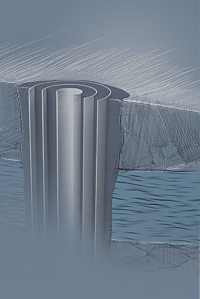Storage
The storage business plays a key role in stabilising the volatile demand for natural gas and ensuring the security of gas supplies to our customers. Given the development of the market and the need to harmonise the storage capacity with the legal requirements, PGNiG is involved in projects designed to expand the existing and construct new underground gas storage facilities.
By 2015, the planned expansion projects are expected to increase our storage capacity to approximately 3 bn m³.
The updated strategy set the following strategic objectives relating to the storage capacity expansion:
- to ensure sufficient storage capacity;
- to organize an internal structure of the legally unbundled Storage System Operator;
- to maintain possibly high margins on the storage business following the launch of new underground gas storage facilities.
Actions taken to pursue these objectives include:
- increasing the storage capacity by approximately 1.4 bn m³, to a total of approximately 3 bn m³, and securing EU funds to finance the projects;
- establishing an internal structure of the legally unbundled Storage System Operator and executing the service agreements;
- maintaining the pre-tax WACC at 8–10% and maximising sales of the storage services.
Our achievements to-date
Since 2009, PGNiG has the status of Storage System Operator. In March 2011, PGNiG applied to the President of the Energy Regulatory Office requesting the designation of Operator Systemu Magazynowania Sp. z o.o. as the Storage System Operator for gas fuels and the granting of a licence for storage of gas fuels in storage facilities. These steps were taken with a view to meeting the obligations under Regulation (EC) No. 715/2009 of the European Parliament and of the Council of July 13th 2009 on conditions for access to the natural gas transmission networks and repealing Regulation (EC) No. 1775/2005.
In December 2011, a new gas fuel storage tariff No. 1/2011 came into force. The tariff was determined based on, among other things, Regulation (EC) No. 715/2009 of the European Parliament and of the Council of July 13th 2009 on conditions for access to the natural gas transmission networks (“Regulation 715/2009”), issued as part of the 3rd energy package. The new tariff specifies charge rates applicable to storage services: (1) in the form of packages, flexible packages or individual services; (2) provided on a continuous or intermittent basis, (3) provided as long-term, short-term or daily services.
In 2011, 730 m m³ of additional storage capacity were made available under long-term gas fuel storage services provided on an intermittent basis at the Strachocina, Swarzów, Brzeźnica, Wierzchowice and Husów facilities, and 21.5 m m³ of additional storage capacity – under short-term gas fuel storage services provided on an intermittent basis at the Mogilno cavern.
In 2011, approximately 75% of the total funds allocated to the construction and expansion of high-methane gas storage facilities was spent to extend the Wierzchowice facility, the largest natural gas storage facility in Poland. Also in 2011 PGNiG completed construction and assembly work on the extension of the Strachocina facility and commenced tests and analyses to determine its operating parameters and other characteristics. We also continued construction of a new high-methane gas storage facility in the Kosakowo cavern, and extension of the Mogilno cavern facility.
Distribution
Distribution plays an important role in the building of the PGNiG Group’s value. The updated strategy provides for the following strategic objectives relating to the distribution business:
- to improve the profitability of the distribution business;
- to optimise costs and functions;
- to optimise development of the distribution network.
Actions taken to pursue these objectives include:
- increasing the regulatory value of assets approved by the Energy Regulatory Office and closing the cost gap in the tariff;
- implementing the strategic procurement functions at the distribution companies, establishing a shared services centre for the distribution companies and optimising/improving network efficiency;
- establishing uniform rules for the distribution network development (including ten-year investment plans), streamlining the legally permitted platform of communicating the demand from customers and the sales business, and launching a pilot programme to assess feasibility of implementing an intelligent meter reading system.
Our achievements to-date
In 2011, the Gas Distribution Companies worked on extending and upgrading the gas network, and connecting new customers to both existing and newly built sections of the network. The Gas Distribution Companies also replaced the most failure-prone sections of cast-iron piping and modernised longest operating sections of the piping whose continued operation posed a safety hazard and caused substantial gas losses.
Sales
PGNiG’s trading business is all about satisfying the domestic demand for gas fuel through transactions of purchase and sale of natural gas. Natural gas is sold to both retail and industrial customers. Given the dynamic changes in the legal and business environments, we are taking a number of steps in the gas trading area to maintain its leading position on the liberalised Polish market.
The updated strategy provides for the following strategic objectives relating to the gas selling business:
- to maintain the leading position on the Polish market;
- to improve operating efficiency.
Actions taken to pursue these objectives include:
- developing a new product mix, improving customer service, winning new customers both within and outside of the transmission network’s geographical coverage, entering the electricity market by approaching small and medium-sized enterprises as well as business customers with a dual-fuel offer (the “gas plus electricity” package);
- developing and implementing actions conducive to natural gas market deregulation, preparing PGNiG for entry of new competitors onto the Polish market.
Our achievements to-date
In 2011, PGNiG sold 14.3 bn m³ of natural gas, with 95% of that amount represented by sales from the transmission and distribution systems and the balance – by direct gas sales from the fields.
The PGNiG Group also took steps to extend the product offer by increasing the output of LNG. This is particularly important on the Polish market, where trade in, transmission and distribution of gas are all regulated businesses. In 2011, the Gas Trading Divisions executed projects supporting development of heat sales, modernisation of boiler rooms and buildings, and projects designed to satisfy the needs of 23 gas sales units.
New Business Areas
As new growth opportunities emerge, PGNiG takes steps to expand the scope and scale of its operations.
The updated strategy set the following strategic objectives for the new business areas:
- to develop the power sector;
- to reorganise the PGNiG Group;
- to enhance the efficiency of a project-oriented organisation;
Actions taken to pursue these objectives include:
- developing gas-fired projects in cooperation with Polish and foreign partners;
- preparing and implementing a reorganization concept of certain PGNiG Group companies, including optimising performance of prospective companies of the PGNiG Group;
- preparing an incentive scheme for members of the project teams, improving the management of large investment and M&A projects and enhancing research competences.
Our achievements to-date
In November 2009, a new company PGNiG Energia SA was established to execute projects focusing on the transformation of the Group into a modern energy conglomerate. PGNiG Energia’s projects will include construction of power-generation units, investment in natural gas-powered cogeneration plants and pilot bio-gas projects. The most important venture currently pursued by PGNiG Energia is the construction of a CCGT plant in Stalowa Wola. The project was initiated with a letter of intent executed between Tauron Polska Energia SA and PGNiG on November 20th 2008. A subsequent execution agreement was signed on May 7th 2010, while the agreement on the operation of Elektrociepłownia Stalowa Wola SA, agreement for the sale of electricity and agreement for supply of fuel gas were executed on March 11th 2011. In the fourth quarter of 2011, the last phase of the procedure for selecting the General Contractor for a combined cycle gas turbine at EC Stalowa Wola SA was commenced.
In August 2011, PGNiG (through a subsidiary) and Vattenfall AB signed a preliminary share purchase agreement for the purchase of 99.8% shares in Vattenfall Heat Poland SA (VHP). In January 2012, the transaction was finalised and the acquired company’s name was changed to PGNiG Termika SA.
The acquisition of the VHP assets, with a total installed capacity of 980 MWe, and the project in Stalowa Wola (50% of 400 MWe), executed jointly with the Tauron Group, will allow PGNiG to almost entirely achieve objectives set in the strategy. The access to the Warsaw heat and electricity market, obtained following the acquisition of VHP, offers an opportunity to implement new projects involving gradual replacement of old coal-fired generating units with gas-fired assets.




